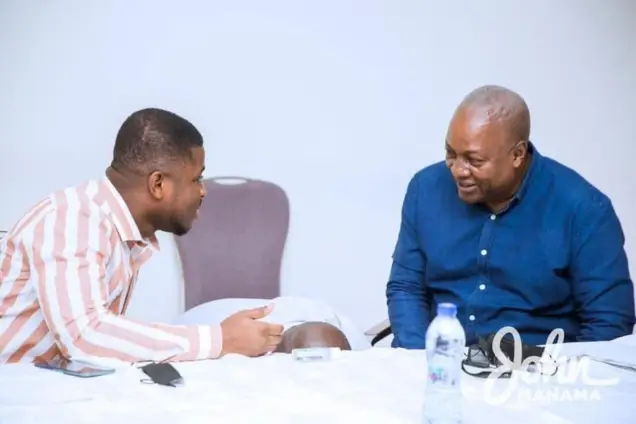The controversy surrounding Sammy Gyamfi, CEO of Goldbod, and his dollar donation to Evangelist Patricia Asiedu, popularly known as Agradaa, has ignited a debate on political ethics and the perception of corruption. Private legal practitioner Austin Kwabena Brako-Powers has called upon President John Mahama to reassign Mr. Gyamfi, arguing that the incident presents a crucial opportunity for the President to demonstrate his commitment to combating corruption and managing public perception. While acknowledging the absence of proof that the donated funds originated from state coffers, Mr. Brako-Powers emphasizes the damaging optics of the situation and the potential for it to fuel speculation and undermine public trust in the government. He argues that Mr. Gyamfi’s actions, as a politically exposed person, warrant a decisive response from the President to reaffirm his administration’s commitment to transparency and accountability.
The incident in question revolves around a video that surfaced online, depicting Mr. Gyamfi handing an undisclosed sum of U.S. dollars to Agradaa during a public event. This act immediately drew criticism and raised questions regarding the source and purpose of the funds. Mr. Gyamfi subsequently issued an apology, characterizing his actions as indiscreet and explaining them as a gesture of goodwill towards the evangelist. However, this explanation failed to quell the rising concerns and criticisms, particularly in the context of President Mahama’s repeated pronouncements on combating corruption. Mr. Brako-Powers argues that this incident directly challenges the credibility of the President’s anti-corruption stance and provides an opportunity for him to demonstrate concrete action.
Mr. Brako-Powers’s central argument hinges on the importance of public perception, particularly in the realm of politics. He contends that regardless of the actual source of the funds, the act of a high-profile political figure like Mr. Gyamfi publicly donating a significant sum of money to a controversial figure like Agradaa creates a breeding ground for speculation and suspicion. This, he argues, is inherently damaging to the government’s image and erodes public trust. Even if the donation was made with entirely innocent intentions, the optics of the situation lend themselves to misinterpretation and fuel narratives of corruption and impropriety. He stresses that in politics, perception often carries more weight than reality, and the potential damage to the government’s reputation necessitates a decisive response.
The lawyer further emphasizes the responsibility that comes with being a “politically exposed person.” He argues that Mr. Gyamfi, holding a prominent position within the government, should have exercised greater caution and discretion in his actions. He should have been mindful of the public scrutiny that comes with his position and avoided engaging in any activity that could be perceived as questionable, regardless of his intentions. Mr. Brako-Powers suggests that Mr. Gyamfi’s failure to consider the potential ramifications of his actions demonstrates a lack of judgment and a disregard for the delicate nature of public perception in the political arena. He argues that this lapse in judgment necessitates a response from the President to reinforce the importance of ethical conduct and accountability within his administration.
While advocating for a strong response, Mr. Brako-Powers stops short of calling for Mr. Gyamfi’s outright dismissal. Instead, he proposes reassignment as a more appropriate course of action. He acknowledges Mr. Gyamfi’s contributions to the National Democratic Congress (NDC), particularly during their time in opposition, and suggests that a complete dismissal might be too harsh a penalty. However, he insists that some form of disciplinary action is necessary to send a clear message that such conduct will not be tolerated. Reassignment, in his view, strikes a balance between acknowledging past contributions and holding Mr. Gyamfi accountable for his actions. This, he believes, would demonstrate the President’s commitment to upholding ethical standards without resorting to extreme measures.
In conclusion, the controversy surrounding Mr. Gyamfi’s donation highlights the critical role of public perception in politics and the importance of maintaining transparency and accountability, particularly for those holding positions of power. Mr. Brako-Powers’s call for Mr. Gyamfi’s reassignment serves as a reminder that even seemingly innocuous actions can have significant repercussions when perceived through the lens of public scrutiny. He argues that President Mahama should seize this opportunity to reaffirm his commitment to fighting corruption and upholding ethical standards within his administration by taking decisive action. This, he believes, would not only address the current controversy but also send a clear message about the importance of integrity and responsible conduct in public service.














